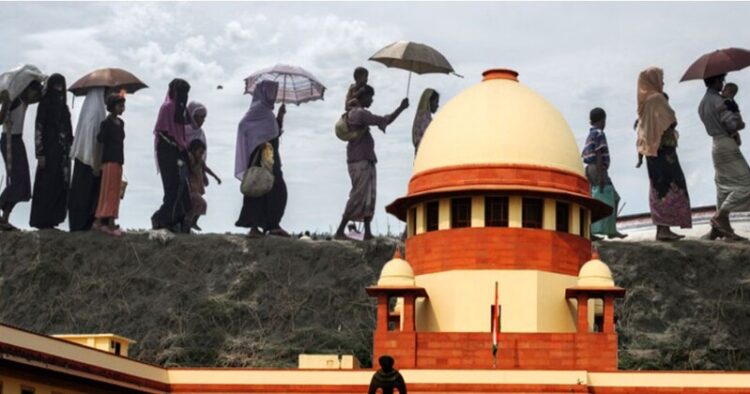In a significant development, the Government of India has made it clear before the Supreme Court that illegal Rohingya Muslim migrants do not possess a fundamental right to reside and settle in India. The Union Government filed an affidavit in response to a plea filed by petitioner Priyali Sur, seeking various directions, including the release of detained Rohingyas.
According to the affidavit submitted to the apex court, the UOI emphasised that individuals illegally entering India would be dealt with under the law and in accordance with the provisions of the Foreigners Act. The Ministry of Home Affairs reiterated that India, as a developing country with limited resources and the largest population globally, prioritises the welfare of its own citizens. As India is not a signatory to the 1951 Refugee Convention and its Protocol relating to the Status of Refugees, the government stated that it would handle the issue of Rohingyas based on its domestic framework.
Furthermore, the UOI highlighted that the judiciary cannot create a separate category for granting refugee status to those illegally entering the country. The affidavit emphasised that refugee status cannot be recognised outside the legislative framework, and any such declaration must adhere to established legal protocols.
The government’s response also addressed concerns regarding the use of UNHCR (United Nations High Commissioner for Refugees) cards by some Rohingya Muslims to claim refugee status in India. The UOI clarified that India does not recognise these cards and underscored the security threats posed by illegal migration, including the acquisition of fake Indian identity documents and involvement in human trafficking.
The affidavit stated, “Continuance of Rohingyas’ illegal migration to India and their stay in India, apart from it being absolutely illegal, is fraught with serious security ramifications.” This assertion underscores the government’s commitment to safeguarding national security interests amidst challenges posed by illegal migration.
Highlighting India’s non-signatory status to the 1951 Refugee Convention and its Protocol relating to the Status of Refugees, the government of India has reiterated its commitment to handle the issue of Rohingyas based on its own domestic framework. The Centre pointed out that the judiciary cannot create a separate category for granting refugee status to those illegally entering the country.
Moreover, India does not recognise UNHCR (United Nations High Commissioner for Refugees) cards, which some Rohingya Muslims have used to claim refugee status. The government’s affidavit also underscored concerns regarding illegal migration and associated activities, such as obtaining fake Indian identity documents and human trafficking, which pose significant security threats to the nation.
The Government of India stated, “Continuance of Rohingyas’ illegal migration to India and their stay in India, apart from it being absolutely illegal, is fraught with serious security ramifications.” This assertion underscores the government’s commitment to safeguarding national security amidst the complex issue of illegal migration.
The Supreme Court is expected to hear the pleas after the Holi vacation, indicating the gravity of the matter and the necessity for careful consideration of legal and humanitarian aspects involved.
The issue of Rohingya Muslim migrants has been a contentious one, with debates surrounding their legal status, humanitarian considerations, and national security implications. The Union Government’s affidavit reflects the government’s firm stance on prioritising the welfare and security of its citizens while adhering to established legal frameworks.




















Comments